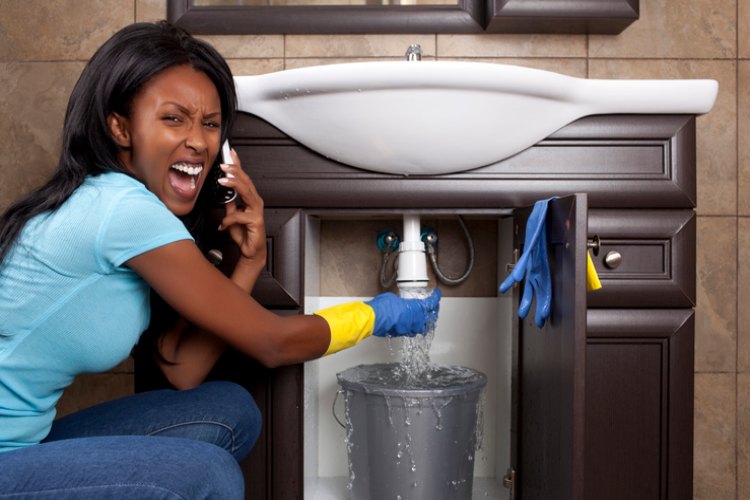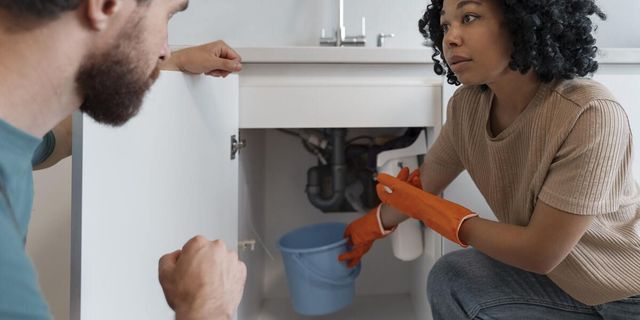Managing Emergency Plumbing Issues: Immediate Solutions Until Specialist Help Arrives
Managing Emergency Plumbing Issues: Immediate Solutions Until Specialist Help Arrives
Blog Article
Every person has their own individual assumption involving What to Do During a Plumbing Emergency.

Plumbing emergencies can strike any time, triggering stress and possible damage to your home. Whether it's a burst pipeline, a clogged up drain, or a dripping faucet, knowing just how to take care of the circumstance until a professional plumbing technician arrives can conserve you from further complications. This post supplies crucial emergency pipes ideas to assist you reduce damages and reclaim control during a plumbing situation.
Turn Off the Water
The very first step in any plumbing emergency is to turn off the water system. For localized concerns, such as a leaking tap or commode, turn off the valve near the fixture. In the case of a significant leak or burst pipe, find your home's primary water shut-off shutoff and transform it off instantly. Knowing the location of these shutoffs beforehand can conserve important time during an emergency.
Address Small Leakages with Temporary Solutions
Small leakages can rapidly become considerable problems if left unattended. Use these short-lived repairs up until professional aid arrives:
While these fixes aren't long-term, they can help reduce water loss and damage.
Unclog Drains Pipes Safely
A blocked drainpipe can be a discouraging and unpleasant issue. Below's just how to tackle it:
If these approaches do not function, stay clear of making use of excessive force, as it might aggravate the clog.
Manage Overflowing Toilets
An overruning toilet can cause immediate mayhem. Right here's what you need to do:
Shut down Your Hot Water Heater
In certain emergencies, such as a burst pipe, it's a good idea to shut down your hot water heater. This stops overheating or damages to the system when water quits streaming. Shut off the power supply to the water heater (electric or gas) and allow it cool off to prevent prospective risks.
Temporarily Stop a Ruptured Pipeline
A ruptured pipe can bring about significant water damages in mins. To minimize the concern:
Call an expert plumbing technician instantly to resolve the problem permanently.
Deal With Frozen Piping Very Carefully
In chillier climates, icy pipes are an usual emergency. If you think a frozen pipe:
Avoid Further Damages
Taking fast action to minimize damages can conserve you time and money in the future. Below's just how:
. Have an Emergency Pipes Kit
Prepare a basic pipes emergency situation package to manage small issues effectively. Your package should consist of:
Having these devices on hand can make a substantial distinction in your capacity to manage emergency situations.
Know When to Call a Specialist.
While quick fixes can assist briefly, particular pipes problems call for immediate specialist attention. Call a plumbing if:.
Quickly speaking to a professional ensures the issue is fixed appropriately and prevents further complications.
Conclusion.
Plumbing emergency situations can be frustrating, but with the right knowledge and tools, you can manage the situation effectively until help gets here. By switching off the water system, attending to small leaks, and making use of short-term fixes, you can reduce damages and maintain your home safe. Keep in mind, these tips are temporary solutions; always get in touch with a licensed plumber to handle the origin of the issue. Preparation and quick thinking are your finest allies in any plumbing emergency.
Expert Tips for Emergency Plumbing Repairs
Plumbing emergencies can be incredibly stressful and inconvenient. Whether it’s a burst pipe, a clogged drain, or a leaky faucet, these common plumbing emergencies need immediate attention to prevent further damage to your home. But before you panic, it’s important to understand the basics of plumbing repairs and the steps you can take to address these emergencies. In this article, we will share some expert tips to help you navigate through these situations and minimize potential water damage.
Identifying Common Plumbing Emergencies
Leaky pipes and faucets Clogged drains and toilets Burst pipes Low water pressure Water heater problems Essential Tools for Plumbing Repairs
Plunger: Useful for unclogging toilets and drains Adjustable wrench: Needed for tightening or loosening nuts and bolts Pipe wrench: Ideal for gripping and turning pipes Tape measure: Necessary for accurate pipe measurements Plumber’s tape: Helps create watertight seals Understanding Emergency Plumbing Services
Emergency plumbing services are designed to provide immediate assistance for unexpected plumbing issues that can cause significant damage to your home, business, or health. These services are typically available 24/7 and are staffed by experienced plumbers who can quickly diagnose and repair a wide range of plumbing problems.
When a plumbing emergency strikes, time is of the essence. Whether it’s a burst pipe flooding your basement or a gas leak posing a serious risk, emergency plumbing services ensure that help is just a phone call away. These professionals are equipped with the tools and expertise to handle any situation, minimizing damage and restoring your plumbing system to proper working order.
What Constitutes a Plumbing Emergency?
Burst pipes or water supply lines: These can cause extensive water damage and need immediate repair to prevent flooding. Gas leaks or suspected gas leaks: Gas leaks are extremely dangerous and require prompt attention to avoid potential explosions or health hazards. Sewer backups or overflows: These can lead to unsanitary conditions and significant property damage. Clogged drains or toilets causing water to overflow: Overflowing water can damage floors, walls, and other structures. Leaks or water damage causing structural damage: Persistent leaks can weaken the structural integrity of your home or business. No hot water or heating: A lack of hot water can be more than an inconvenience, especially in colder months. Common Causes of Plumbing Emergencies
Aging or corroded pipes: Over time, pipes can deteriorate, leading to leaks or bursts. Improperly installed or maintained plumbing fixtures: Faulty installations or lack of maintenance can result in unexpected failures. Tree roots or other debris infiltrating your sewer line: Roots can grow into pipes, causing blockages and backups. Frozen pipes or water supply lines: In colder climates, pipes can freeze and burst, leading to significant water damage. High water pressure or sudden changes in water pressure: Excessive pressure can strain pipes and fixtures, causing them to fail. Natural disasters such as floods or earthquakes: These events can disrupt your plumbing system and cause severe damage. Steps to Minimize Water Damage
Locate the water shut-off valve: Knowing where the valve is can help you quickly cut off the water supply to the affected area. Turn off the water heater: If there’s a risk of water coming into contact with the heating element, make sure to turn off the water heater to avoid potential accidents. Open faucets and drain pipes: By opening faucets and drain pipes, you can relieve pressure and empty any standing water. Collect and contain water: Use towels, buckets, or bins to collect water and prevent it from spreading to other areas of your home. https://leecountyplumbingandwellservice.com/expert-tips-for-emergency-plumbing-repairs/

I'm just very inquisitive about What to Do While Waiting for an Emergency Plumber and I'm hoping you enjoyed the entire article. In case you enjoyed our blog entry kindly be sure to share it. Thank you so much for taking the time to read it.
Book Report this page